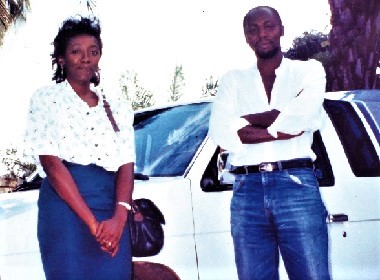Reading a tribute to a dearly departed is not easy. I learned that the hard way last year when I broke down in tears reading one about my late uncle and Ebusuapanyin at the St Cyprian Anglican Church, Kumasi.
This year, when my mother passed, I knew better than to mount a podium and drown in my own tears. So I had an immense esteem for Harruna Atta, having mustered the courage – flanked by his two bright daughters – to honour his dear wife, Nana Yaa Ofosuhemaa Agyeman. Again, to have the valour to lace humour into the fabric of the delivery – to tame his grief - was extraordinary. How do you bid farewell to a lifelong partner of 40 odd years!
I first met the couple during one of my vacation travels to Ghana from the US in the 1980s. At the time, and from subsequent visits, I’d get Nana Yaa to model her tall slender figure for photographs to show my two small daughters - her little nieces who had never met her.
Those were evolving times for her as she navigated through Ghana Broadcasting Corporation (GBC), then with Charles Wereko Brobbey, and later teaming up with her husband, Harruna, to edit the “Imagine” magazine, “The Statesman”, and finally “The Accra Mail”. Through thick or thin, she exhibited an unforced royal elegance even as she raised her two small girls.
In recounting how he himself was a Dagomba and a Muslim, with his wife an Ashanti and a Christian, he always brought the church down with the affirmation: “Yes, it can work!” In my mind, I seconded that emotion relating how my own father being a Sunni Muslim of a different race and my Ghanaian mother a Catholic Christian, cuddling together to release from that union a daughter and two sons. Yes, it can work!
At the end of Harruna’s delivery, I asked if I could publish his tribute to a loving wife, and having said, “Sure. By all means, go ahead” this is it – a classic, unedited as it appeared in the funeral brochure:
Harruna’s paean and lament
I have always wondered what it means, or feels like, to be a widower. This is a group of men I thought of as being a special breed apart, to be treated with pity and perhaps even held in wonderment. Men who had lost their wives, drifting about in a sea of all manner of memories and unfinished partnership.
It never crossed my mind that I would one day be shoved into this category of pitiful/piteous men. And then, it happened: on August 17, 2022, almost exactly one month to my 70th birthday. So, here I am, a 70-year-old widower standing in front of my wife's casket to declare my widowhood, with you as witnesses.
I remember days where, when filling any official form with space for "marital status", I would write, without any hesitation, "married". In the space for "next of kin", it also would come without effort: Nana Yaa Agyeman. Now, I am a widower and I already know what it means and feels like. My marital and next of kin status have changed. Forever.
This is supposed to be a tribute, but can there be tribute without context? My context is at once a paean and at the same time a lament, certainly not a sermon! The paean, to exalt a nonpareil, and the lament, of losing that nonpareil – a valuable part of my life. It would be easy for this widower to launch into sentimentality, and though he would be forgiven, that must be avoided, but with clear words of respect and affection, register these few words of farewell.
In this gleaming white casket lying before us, rests what used to be an active, immaculate and elegant human being – my wife.
We may be saddened by what we see before us, but she has been very successful, whether looked at from the angle of creationism or Darwinism. She attracted a mate and together they passed on the genes assuring that our species will continue to flourish.
The genes that are found in our most remarkable daughters. She has done her duty there. I did not expect that she would make me a widower, or that I would make her a widow – because that is what is expected of wives – to live and let their husbands die first. And though I mourn, I do not despair, because it is a triumphal departure.
What more could one ask of his departed spouse? It was also an experiment that proved really successful. An experiment where a Dagomba and Ashanti were tossed about in the crucible of life with Islam and Christianity acting as catalyst.
The resulting product worked! Forty years of marriage passed by so peacefully and productively that, barring a hiccup here and there - mostly this widower's fault – and 40 years on, this widower can look back and say, we tried and it worked.
Thank you, NYA, as I was wont to say, when regaling you with my many stories, "to cut a long story”: I am cutting this one short. But one last word: You are surely one person I would like to meet after my own death – something I cannot say of many members of my family and friends.
And with this final confession, I say, catch you! (Alhaji Abdul-Rahman Harruna Attah, MOV).
The writer is a trainer of teachers, a leadership coach, a motivational speaker and quality education advocate. E-mail: anishaffar@gmail.com

